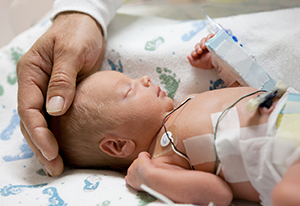Understanding Apnea of Prematurity
 |
| You may be trained to use light touch to stimulate your baby to breathe. |
Many preemies have apnea (pause in breathing for more than 15 to 20 seconds). For some babies apnea can cause the heart rate to slow down (bradycardia) and/or the oxygen level in the baby’s blood to drop (desaturations). Action may be needed to restart the baby’s breathing. In some babies, apnea occurs only during sleep. In most cases, the problem resolves over time.
What causes apnea in premature infants?
- Immature nervous system is the main cause. A premature baby’s brain and reflexes aren’t fully developed. So the baby may not have the reflex to breathe when the blood oxygen level is too low. Premature babies' airways are also more likely to be blocked when their head and neck are bent or when they are in an upright position, like in a car seat.
- Fatigue may make apnea worse. Breathing is hard work, and preemies’ muscles are not yet fully developed. The baby may also find feeding to be tiring.
- Feeding immaturity may make apnea worse. A baby may stop breathing because he or she hasn’t yet learned to coordinate suckling, swallowing, and breathing.
- Other problems, such as infection or illness, may also worsen apnea.
How is apnea treated?
- Mild stimulation. Rubbing the baby’s back or feet or patting the skin stimulates the baby’s nervous system, which can restart breathing.
- Medicines. Caffeine may be given in the hospital to help stimulate breathing.
- CPAP (continuous positive airway pressure) or nasal cannulas (prongs in the nose). These methods send a gentle, continuous stream of air into the baby’s airways, helping to ease breathing. They can also be used to give the baby extra oxygen if needed.
- Ventilation. A machine called a ventilator assists breathing by giving the baby breaths of air, oxygen, or a mixture through a tube that goes directly into the windpipe.
- Addressing other problems, such as feeding immaturity or infection, can also help.
What happens if my baby stops breathing?
While in the NICU (neonatal intensive care unit), your baby is closely monitored. If the baby doesn’t breathe for a certain number of seconds, an alarm goes off. NICU staff will then check the baby. If the baby is not breathing, stimulation, oxygen, or ventilation is used to restart breathing. This is done very quickly to help prevent any harm to your baby.
What are the long-term effects?
Apnea of prematurity goes away as a baby matures. Once it goes away, there are no long-term effects. Most infants are over apnea by the time they’re ready to leave the NICU. A few babies may leave the NICU with a home monitor or caffeine medicine. Babies who have had apnea of prematurity are not more prone to SIDS (sudden infant death syndrome) later on.
© 2000-2021. The StayWell Company, LLC. 800 Township Line Road, Yardley, PA 19067. All rights reserved. This information is not intended as a substitute for professional medical care. Always follow your healthcare professional's instructions. This information has been modified by your health care provider with permission from the publisher.